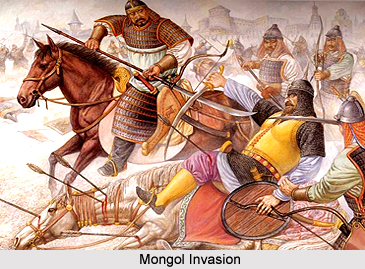 The Mongol Empire, the largest Mongolic group that existed during the 13th and 14th centuries, belonged to the Central-North Asian ethno-linguistic group. Reported to have ruled over almost 100 million, the Mongols maintained a stronghold over Eastern Europe, parts of Siberia, Middle East, Southeast Asia, the Iranian plateau and the Indian subcontinent. The combination of Mongol and Turkic tribes formed the Mongol Empire that functioned under the rule of Genghis Khan. Under his rule the Empire flourished rapidly. They invaded several countries and established their rule there. From 1221 to 1327 the Indian subcontinent was invaded repeatedly by the Mongols who formed Kashmir as their vassal state. Although they remained successful in capturing parts of Punjab but their invasions against the Delhi Sultanate remained unsuccessful.
The Mongol Empire, the largest Mongolic group that existed during the 13th and 14th centuries, belonged to the Central-North Asian ethno-linguistic group. Reported to have ruled over almost 100 million, the Mongols maintained a stronghold over Eastern Europe, parts of Siberia, Middle East, Southeast Asia, the Iranian plateau and the Indian subcontinent. The combination of Mongol and Turkic tribes formed the Mongol Empire that functioned under the rule of Genghis Khan. Under his rule the Empire flourished rapidly. They invaded several countries and established their rule there. From 1221 to 1327 the Indian subcontinent was invaded repeatedly by the Mongols who formed Kashmir as their vassal state. Although they remained successful in capturing parts of Punjab but their invasions against the Delhi Sultanate remained unsuccessful.
Conflict between Genghis Khan and Jalal ad-Din
Genghis Khan upon tracking down Jalal ad-Din from Samarkand defeated him in the battle of Indus in 1221. He then appointed Dorbei the Fierce and Bala as the commanders of 20,000 soldiers and instructed then to continue the chase. Jalal ad-Din was chased throughout Punjab by Bala. The later on his way also invaded few outlying towns such as Multan and Bhera. Jalal ad-Din also formed a small group and proposed for a treaty with the Turkic rulers of Delhi Sultanate who refused his proposal. The army battled with the local rulers reigning in Punjab and defeated them. He finally made a pact with the khokhar chieftain of the Salt Range. Jalal ad-Din`s army was soon joined by Khokhar Rai`s son and was bestowed with the title Kalich. Jalal ad-Din soon received the news of a revolt in southern Iran in Kirman province. He with his force immediately marched towards Iran and was joined on his way by forces from Peshawar and Ghor. The army men also comprised of soldiers from Ghori tribes, Khilji and Turkoman. With the strong forces he marched ahead and overpowered a Mongol army under Turtai. However, due to a quarrel that broke out over the division of the captured wealth, the Ghori tribesmen, Khilji and Turkoman parted ways. Ogedei Khan, the third son of Genghis Khan by this time had gained much power. He sent Chormaqan, a Mongol general behind Jalal ad-Din who easily defeated him and thus, ended the reign of Khwarazm Shah Dynasty.
Mongol Conquest of Kashmir
In 1235 The Mongol forces attacked Kashmir and occupied it. Kashmir thus, came under the Mongolian dependency. Peshwar was next invaded by the Mongol army under Pakchak. They defeated the tribal army that had severed ties with Jalal ad-Din. The Indus valley was next invaded by the Mongols in 1241. They besieged Lahore and on 1241 the Mongols under Munggetu plundered the town.
During 1254-1255 the Kashmiris revolted. Mongke Khan selected Sali and Takudar, his generals for replacing the court. He also appointed Otochi, a Buddhist master as the darugachi of Kashmir. Otochi was however, killed by the Kashmiri king. Later Sali attacked Kashmir and killed the king thus, forcing the country to remain under the rule of the Mongol Empire for several years.
Conflict between Chagatai Mongols and Delhi Sultanate
Mongol Empire during the 1280s was led by Duwa Khan. He with a view to establish Mongal Empire in India sent a huge force to Punjab in 1292. The army was however, defeated. The Mongols repeatedly attacked Northern India and won in their last two ballets. In 1297 the Mongol army and the Delhi Sultanate army met at Jalandhar. The Delhi Sultanate army under Zafar Khan easily defeated the Mongols and produced them before Ala-ud-din Khilji.
Conflict between Mongols and Alauddin Khilji
In 1299 Ala-ud-din Khilji waged a war on the Mongols. The Khilji army under Zafar Khan defeated the Mongols and forced them to withdraw. Later Zafar Khan was killed by Mongol general Qutlugh Khwaja. The Mongol forces then attacked Ala-ud-din Khilji when the later was occupied with attacking Chittor. He was thus, forced to retreat. Alauddin strengthened his forts with larger garrisons and equipped it with weapons. Despite the measures taken the Mongols under Ali Beg and Tartaq ransacked Punjab. Ala-ud-din Khilji next sent a strong force under Ghazi Malik and Malik Kafur. They made a surprise attack on the Mongols and defeated them.
The final Mongol invasion of this period took place in 1307-8 under Iqbalmand and Tai Bu. Alauddin Khilji sent his armies under Ghazi Malik to Kandhar, Kabul and Ghazni. These attacks effectively suppressed the Mongols.






































